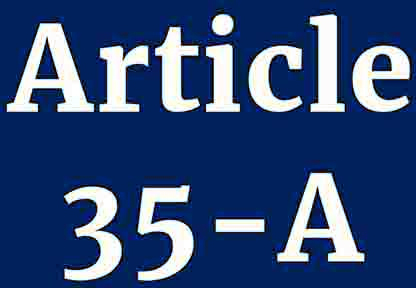By Sant Kumar Sharma
JAMMU: There were celebrations at Labba Ram Gandhi’s house in Samba district as dozens of his supporters raised slogans in favour of Prime Minister Narendra Modi on Tuesday. For them, voting in assembly elections for the first time in decades was a novel experience. Gandhi is a leader of the West Pakistani Refugees (WPRs) who had come to Jammu & Kashmir in 1947. Mostly from Sialkot district of then West Punjab which became a part of the new born nation of Pakistan at that time.
Due to Article 370 and 35-A, these people were defined officially as Non Permanent Residents (NPRs) and had no voting rights in any local elections in J&K. On the other hand, since they had become Indian citizens, they were able to vote in parliamentary elections. Incidentally, there were two voters’ lists in J&K till some years ago, one for holding the Lok Sabha elections and one for the assembly elections.
Not any longer. After the abrogation of Article 370 and 35-A in August 2019, West Pakistani Refugees (WPRs) got the rights to vote in all elections.
Valmikis were another group of Indian citizens who could not vote in any local elections in J&K. According to official records, 277 families of Valmikis were brought in by J&K government from Punjab in 1957 to break a strike by safai karamcharis. These people settled here, mostly in Jammu city, but were given no rights by the J&K government. Right since 1957, the Valmikis were treated as “outsiders’’ by successive J&K governments.
No longer so. They too voted in large numbers on Tuesday and most of them were thanking the BJP for enabling them to participate in the assembly elections. For at least three generations, they could not participate in the assembly, panchayat or urban local bodies (ULBs) elections. Nor could they get any jobs in J&K. All that has changed now.
The third such group which voted in the just concluded J&K elections was that of the Gorkhas, Indian citizens but not treated as bona fide domiciles of J&K. Hence they too were participating in the Lok Sabha elections but in no local elections in J&K. Their forefathers had come from Nepal to join the military service in employment of Dogra kings. They settled here, lost their lives too while fighting in far-off lands but post-1947, found themselves treated as “outsiders’’.
No domicile rights, no jobs, no seats for their wards in professional educational institutions meant they were treated as second or third rate residents in J&K. But this has changed now. No longer are they condemned as far less than equal citizens and participated enthusiastically in voting for assembly elections.
Senior BJP leaders claimed during their campaign speeches that these groups of West Pakistani Refugees, Valmikis and Gorkhas are solidly behind them. The reason for their support is that the BJP enabled them to become domiciles of J&K and vote in the assembly elections. A couple of years, rather decades later, these people may vote for other parties also but they are all backing the BJP this time, party leader Sunil Prajapati says.
Out of the 24 assembly segments of the Jammu region that saw polling on Tuesday, these groups are present in at least 10 or 12 segments. Their one-sided vote for the BJP can give the party an advantage like no other, he pointed out. These votes could prove to be decisive in most of these segments, he added.
Incidentally, West Pakistani Refugees are present in many assembly segments located along the international border (IB) with Pakistan. These assembly segments are Kathua, Jasrota, Hiranagar, Samba, Ramgarh, Vijaypur, Bishnah, Suchetgarh and Chhamb.
The Valmikis are present in strength in the R S Pura-Jammu south assembly segment. The Gorkhas are present mostly in Bahu assembly segment and in lesser numbers elsewhere too. Karuna Chhetri is a Gorkha woman leader who has been vocal for the rights of her community. She says the BJP is the party which has helped them gain a firm foothold in J&K after decades and they are grateful for that.
At Nihalpur in Kathua district, Ruldu Ram, eight years short of a century, became a minor celebrity for some time as he cast his vote for the first time for the assembly. Ruldu Ram, 92, was deprived of this constitutional right for decades together.
“First time since 1947, members of our community are participating in the assembly elections despite the fact that our families have living in villages of the Jammu region for the last 76 years,” Labha Ram Gandhi pointed out.
Valmiki leader Gharu Bhati, who voted at a polling station in Jammu, said, “I am a first-time voter at the age of 45. We are thrilled and filled with enthusiasm to participate in J-K’s assembly elections for the first time. It is like a big festival for us.”
Other things apart, after becoming eligible voters in all elections, no political party of J&K will be now able to ignore these communities. A week from now, we will also know whether they voted en bloc in favour of any party and could prove decisive in the final outcomes. (IPA Service)


